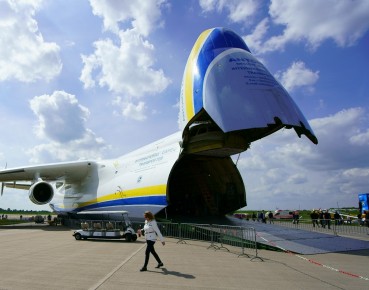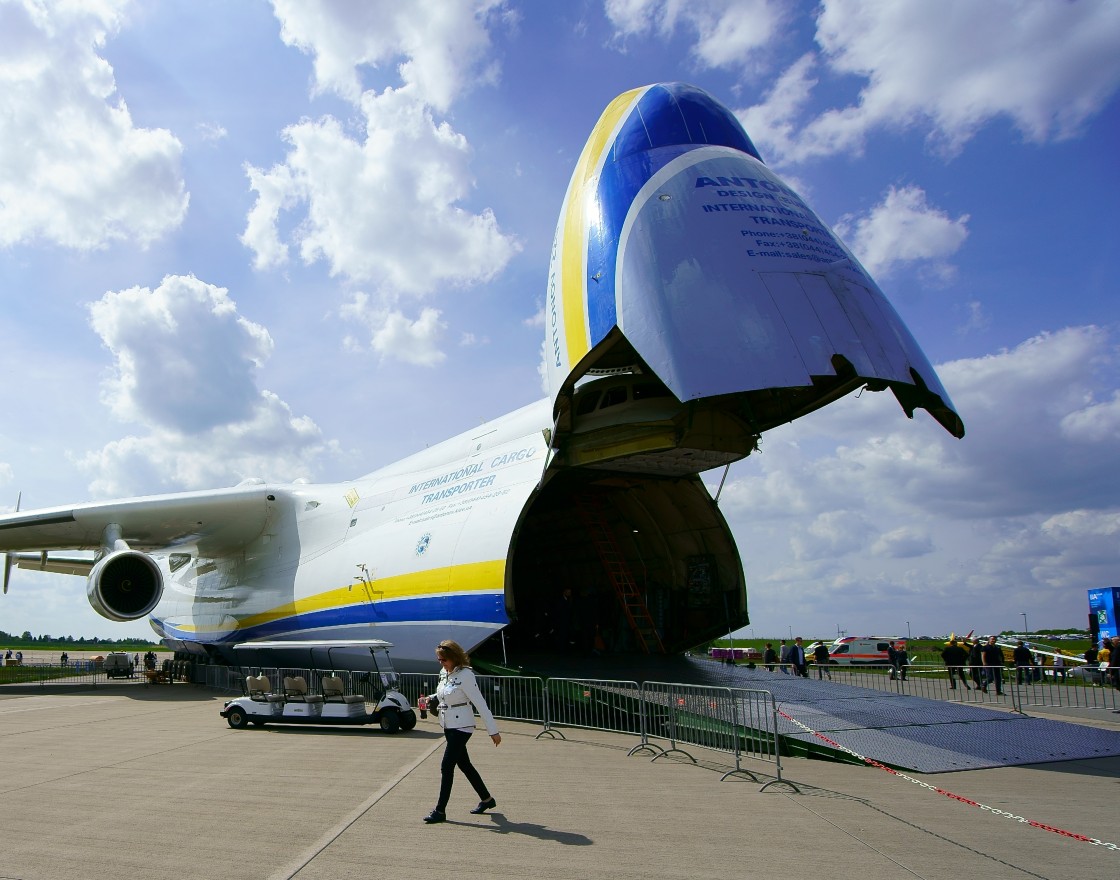Tydzień w gospodarce
Category: Trendy gospodarcze

Antonow An-225 (Lutz Blohm, CC BY-SA 2.0)
Ukraine inherited the Antonov aircraft factory in Gostomel, outside of Kiev, from the Soviet Union. The production had for many years flooded the aviation markets of Eastern Bloc and the Third World countries with its products, but after the collapse of communism came to an almost complete standstill. Today, instead of boasting about the numbers of built and sold new airplanes and the newly signed purchase orders, the company is publishing reports on the successive stages of assembly of the fuselage for a single aircraft ordered by the Ministry of Internal Affairs of Peru.
The situation is supposed to change. In May 2020, the Ukrainian President Volodymyr Zelensky announced plans concerning the establishment of a national airline, which would offer passenger transport services using the airplanes manufactured at the Antonov plant. “My dream is to create a modern, state-owned airline similar to Turkish Airlines or Singapore Airlines. The state is prepared to spend money on this purpose,” said Mr. Zelensky.
“The creation of a national carrier would ensure orders for Antonov, and, in turn, the existence of such a trustworthy national airline would be beneficial for the state,” said Kyrylo Tymoshenko, the Deputy Head of the Presidential Administration of Ukraine. “The airplanes produced at the Antonov plant could easily handle regional flights between the cities of Ukraine, as well as flights to the nearest neighbouring countries. The Antonov plant is an enterprise that is consuming resources. In this situation, we should prepare purchase orders and establish an airline company. The plant would be working, building airplanes, and the air carrier would be carrying passengers. The Ukrainian state should have the guarantee that it will always be able to rely on its national air carrier in the event something happens,” commented Mr. Tymoshenko. In his concept the existence of a national air carrier would be seen as a certain kind of “insurance policy” in the event of an emergency situation. Meanwhile, calculations concerning the costs associated with the implementation of this plan are currently underway.
“The Ministry of Infrastructure is preparing the concept for the establishment of such an airline on the basis of the Antonov aircraft plant and several airports,” said the Ukrainian prime minister Denys Shmyhal in mid-June. For a start, six airplanes would be built in the plant in Gostomel. The government’s calculations show that in addition to reviving the Antonov plant, the implementation of this plan could lead to the creation of thousands of new jobs in entities serving as Antonov’s sub-contractors.
The Ministry of Infrastructure announced that airplanes produced by the Antonov plant would carry passengers on domestic routes. The government isn’t ruling out partnerships with larger foreign air carriers — this could be an opportunity for LOT Polish Airlines, which could transport millions of Ukrainian workers travelling between their home country and various destinations in Europe.
At the turn of April and May 2020, the defence industry group “Ukroboronprom”, which also controls the State Enterprise Antonov, carried out a due diligence of the company. “The inspection was based on the order of the Prime Minister to verify the information as to the existence of any threats to the functioning of the State Enterprise Antonov. The results of the inspection were not shared with the company. The list of supposed threats, which became the basis for the inspection, wasn’t presented either. We would like to inform you that the State Enterprise Antonov is financially stable regardless of the quarantine and is fully implementing its obligations”, said the company’s management in a statement.
Before that Antonov informed about the decision, which was seen as essential to the successful reconstruction of the Ukrainian aviation industry, to eliminate the positions of the director for restructuring and development and the vice president of the management board for marketing and sales.
At the end of May, the future of the Ukrainian aviation sector was discussed by the National Security and Defence Council of Ukraine. The representatives of the Ukrainian aviation industry pointed out that the actions taken by Ukroboronprom had been ineffective. In response to these charges, Ukroboronprom dismissed the managing director of the Antonov plant. The matter of the company’s management was discussed by courts, which have repeatedly restored the CEO to his post, or confirmed that his termination was lawful.
For the time being, however, the plan to build a Ukrainian national air carrier and to make money on international air transport has been hurt by misguided efforts in the area of marketing. The foreign clients who use the services of the Ukrainian aviation industry in connection with the pandemic are paying a lot of money for the contracted cargo flights. They want to be treated accordingly and expect high-quality services. However, the Ukrainians have attempted to present them not as customers but as applicants in need of help to whom Ukraine is generously providing assistance.
“Ukraine is not a wealthy nation, but we decided we had to do whatever we could to help those suffering. Ukrainian engineers have designed and built the world’s largest cargo plane, which has delivered medical supplies from China to Poland, France, Germany and other European Union countries,” wrote Mr. Zelensky in an op-ed in The New York Times. So he presented these services as a charity, while all countries paid for them a substantial amounts.
At the end of April 2020, the chain of building and home improvement hypermarkets Epicentr K — belonging to the Ukrainian oligarch and member of the parliament Oleksandr Gerega — paid USD1.3m for a single flight of the Antonov An-225 Mriya from China with a cargo load of 103 tons. This is a few hundred thousand dollars less than the amount paid at the same time by Poland. The differences in the prices between domestic and foreign clients of Antonov were even greater.
In order to fly, airplanes need a place to land and to take off. Because of that Ukraine wants to develop its network of airports. Talks on the possible use of the existing airport in Uzhgorod in the Transcarpathian Oblast are currently held with Slovakia. This airport was built during the times of the Soviet Union on the border of what was then Czechoslovakia, and its runway is adjacent to the border. Today, landings and take-offs can only be executed from the Slovakian side, and this would require the consent of that country’s aviation authorities. In order to allow the normal functioning of the Uzhgorod airport, an international agreement would have to be signed between Ukraine and Slovakia, which would regulate the rules for Ukrainian use of the Slovak airspace in the region.
There are also plans to create a cargo hub based on the airport in the city of Khmelnytskyi in the Podolia region. However, in this case the situation doesn’t look too good either. The suspension of air traffic as a result of the pandemic has negatively impacted the financial foundations of even those few Ukrainian airports which have been profitable until now.
Ukraine’s main window to the world — the Boryspil International Airport near Kiev — is also facing serious difficulties. This is not surprising, since in May 2020 its passenger traffic only amounted to 2 per cent of the traffic recorded in May 2019. Meanwhile, the second largest airport in Ukraine — the Igor Sikorsky International Airport in Kiev — is on the verge of bankruptcy. Its situation is so bad that Ukrainian artists organized a charity concert in order to raise at least some funds and to help it. Many regional airports in Ukraine have been dependent on the support of local authorities for quite some time, and they are currently hardly conducting any operations at all. In this situation, it is probably not surprising that Ukraine is looking for potential partners to invest in this market.
In May 2020, Mr. Zelensky offered Israel a stake in the airport in the city of Cherkasy (central Ukraine), which has traditionally served the charter flights of Israeli Hasidic Jews going to Uman — a center of religious cult for this denomination of Judaism.
The recent push for investment in Ukrainian airports provides an opportunity for Poland. The involvement of Polish capital in this part of the Ukrainian economy, and the acquisition of one of the neglected airports in the south-east part of the country would allow the establishment of a foothold for Polish businesses. It should be noted that this is a promising region with a high concentration of key industrial centers and areas of chernozem soils. Moreover, such involvement would certainly facilitate the recruitment of seasonal workers from the region.
The Ukrainian plans for the domestic aviation sector are ambitious, but there are some difficulties when it comes to financing. The funds available for the development of the aviation industry are so scarce that in May 2020, the Ukrainian parliament adopted proposed changes to Ukraine’s airline code, which introduced fees for passengers departing from Ukrainian airports, as well as fees for cargo exported and imported by air. The carriers will have to pay USD0.5 per passenger on domestic flights and USD2 per passenger on international flights. Meanwhile, one ton of cargo freight will cost USD2.5 on domestic flights and USD10 on flights going to and from other countries. The money is supposed to be spent on “a special state fund to finance aviation activity and Ukraine’s participation in international aviation organizations.”
According to data presented by the State Statistics Service of Ukraine (Ukrstat), last year air transport in Ukraine carried a total of 100,000 tons of cargo and 13.6 million passengers. Therefore, the maximum possible amount that could be derived from the fees is USD28m.

